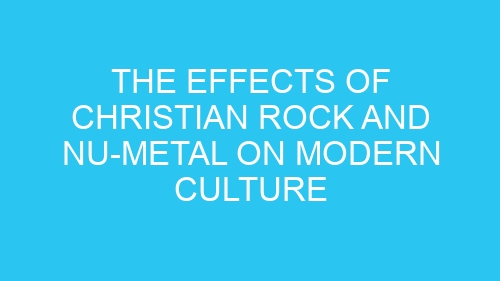-
Table of Contents
The Influence of Christian Rock and Nu-Metal on Youth Culture
Christian rock and nu-metal may seem like an unlikely pair, but these two genres have had a significant impact on modern culture, particularly in the realm of youth culture. From their catchy tunes to their thought-provoking lyrics, Christian rock and nu-metal have managed to capture the hearts and minds of young people all over the world. So, let’s dive into the influence of these genres and explore how they have shaped the youth culture of today.
Firstly, let’s talk about Christian rock. Now, I know what you’re thinking – how can rock music and Christianity possibly go hand in hand? Well, believe it or not, Christian rock has managed to bridge the gap between the sacred and the secular, creating a unique space for young Christians to express their faith through music that actually rocks. It’s like a holy mosh pit, if you will.
Christian rock bands like Switchfoot and Skillet have become household names, with their infectious melodies and uplifting messages resonating with young people from all walks of life. These bands have managed to take the age-old message of Christianity and package it in a way that is relevant and relatable to today’s youth. It’s like they’ve added a dash of holy water to the rock music recipe, creating a genre that is both spiritually fulfilling and head-bangingly awesome.
But let’s not forget about nu-metal, the rebellious cousin of Christian rock. Nu-metal emerged in the late 90s and early 2000s, with bands like Linkin Park and Korn leading the charge. This genre combined elements of heavy metal, hip-hop, and alternative rock, creating a sound that was both aggressive and introspective. It was like a musical therapy session for angsty teenagers everywhere.
Nu-metal spoke to the frustrations and struggles of young people, addressing issues like depression, addiction, and societal pressures. It provided an outlet for teenagers to express their emotions and find solace in the music. And let’s be honest, who hasn’t screamed along to the lyrics of “Crawling” or “Freak on a Leash” at some point in their lives? It’s like therapy, but with a killer guitar solo.
So, what happens when you combine the spiritual fervor of Christian rock with the raw emotion of nu-metal? You get a powerful concoction that has the potential to change lives. This fusion of genres has allowed young people to explore their faith while also addressing the struggles and challenges they face in their everyday lives. It’s like a musical support group, providing comfort and guidance through the power of music.
The influence of Christian rock and nu-metal on youth culture cannot be overstated. These genres have given young people a voice, a sense of belonging, and a way to navigate the complexities of life. They have created a space where faith and doubt can coexist, where spirituality and rebellion can walk hand in hand. It’s like a musical tightrope act, balancing on the edge of belief and doubt.
In conclusion, Christian rock and nu-metal have had a profound impact on modern culture, particularly in the realm of youth culture. These genres have provided young people with a means to express their faith, address their struggles, and find solace in the power of music. So, next time you find yourself headbanging to a Christian rock anthem or screaming along to a nu-metal classic, remember the influence these genres have had on the youth culture of today. It’s like a divine intervention, one power chord at a time.
Exploring the Evolution of Christian Rock and Nu-Metal in Contemporary Music
Christian rock and nu-metal may seem like an unlikely combination, but these two genres have had a significant impact on modern culture. From their humble beginnings to their current popularity, the evolution of Christian rock and nu-metal in contemporary music is a fascinating journey.
Let’s start with Christian rock. This genre emerged in the 1960s as a way for Christian musicians to express their faith through rock music. It was a bold move, considering that rock music was often associated with rebellion and anti-establishment sentiments. But these Christian rockers were determined to spread their message of love and hope through the power of electric guitars and catchy melodies.
In the early days, Christian rock struggled to find its place in the mainstream music scene. It was often dismissed as cheesy or preachy, and many critics believed that faith and rock music simply didn’t mix. But as time went on, Christian rock began to gain traction, thanks in part to bands like Petra and Stryper who brought a heavier sound to the genre.
Fast forward to the 1990s, and we see the rise of nu-metal. This genre took the aggression and angst of traditional heavy metal and combined it with elements of hip-hop and alternative rock. Bands like Korn and Limp Bizkit became the poster children for nu-metal, with their aggressive riffs and raw lyrics resonating with a generation of disenchanted youth.
But what does all of this have to do with Christian rock? Well, in the late 1990s and early 2000s, a new wave of Christian rock bands emerged, blending the heavy sound of nu-metal with lyrics that focused on faith and spirituality. Bands like P.O.D. and Skillet brought a fresh perspective to Christian rock, appealing to both Christian and non-Christian audiences alike.
The impact of Christian rock and nu-metal on modern culture cannot be overstated. These genres have provided an outlet for musicians to express their beliefs and connect with listeners on a deeper level. They have also challenged the notion that faith and rock music are mutually exclusive, proving that spirituality can be found in even the most unlikely places.
But it’s not just the music itself that has had an impact. Christian rock and nu-metal have also influenced fashion, with their distinctive styles becoming synonymous with rebellion and individuality. From the dreadlocks and baggy pants of nu-metal to the tattoos and piercings of Christian rockers, these genres have left an indelible mark on the fashion world.
In addition, the themes explored in Christian rock and nu-metal have resonated with a generation of listeners who are searching for meaning and purpose in a chaotic world. The lyrics often touch on topics such as addiction, depression, and the struggle to find one’s identity. By addressing these issues head-on, Christian rock and nu-metal have provided a sense of solace and understanding to those who feel lost or misunderstood.
In conclusion, the evolution of Christian rock and nu-metal in contemporary music has had a profound impact on modern culture. These genres have challenged stereotypes, influenced fashion, and provided a voice for those who feel marginalized. Whether you’re a fan of Christian rock, nu-metal, or both, there’s no denying the lasting legacy of these genres. So crank up the volume, headbang to the beat, and let the power of music guide you on your own personal journey of faith and self-discovery.
Analyzing the Societal Impact of Christian Rock and Nu-Metal on Religious Beliefs
Christian rock and nu-metal may seem like two completely different genres of music, but they have both had a significant impact on modern culture, particularly in terms of religious beliefs. While Christian rock aims to spread the message of Christianity through music, nu-metal takes a more rebellious approach, often exploring darker themes. Despite their differences, both genres have managed to influence society in unique ways.
Christian rock, with its catchy melodies and uplifting lyrics, has become a popular choice for many religious individuals. It provides a way for believers to connect with their faith on a deeper level, while still enjoying the sounds of contemporary music. In fact, Christian rock has even managed to infiltrate the mainstream music scene, with bands like Switchfoot and Skillet gaining widespread popularity. This crossover success has allowed the genre to reach a wider audience, spreading the message of Christianity to those who may not have been exposed to it otherwise.
On the other hand, nu-metal has taken a more unconventional approach to religious themes. With its heavy guitar riffs and aggressive vocals, this genre has often been associated with rebellion and angst. However, nu-metal bands like P.O.D. and Linkin Park have managed to incorporate spiritual elements into their music, exploring themes of faith and redemption. This unique blend of heavy music and religious undertones has resonated with many listeners, particularly those who may have felt alienated by traditional religious institutions.
The impact of these genres on religious beliefs cannot be understated. Christian rock has provided a platform for believers to express their faith in a modern and relatable way. It has allowed them to connect with their spirituality on a deeper level, while still enjoying the sounds of contemporary music. This has helped to bridge the gap between traditional religious practices and the modern world, making Christianity more accessible to a wider audience.
Similarly, nu-metal has challenged traditional notions of what religious music should sound like. By incorporating heavy music and exploring darker themes, this genre has attracted listeners who may have otherwise been disinterested in religious messages. It has provided an alternative avenue for individuals to explore their spirituality, offering a sense of belonging and understanding to those who may have felt excluded by traditional religious institutions.
In addition to their impact on religious beliefs, both genres have also had a significant influence on popular culture as a whole. Christian rock has managed to break through the barriers of the religious music industry, gaining mainstream success and recognition. This has not only helped to normalize the genre, but it has also opened doors for other religious artists to find success in the secular music world.
Similarly, nu-metal has left its mark on popular culture, particularly in the early 2000s. With its rebellious attitude and raw energy, this genre became a symbol of teenage angst and rebellion. It provided an outlet for young people to express their frustrations and emotions, resonating with a generation that was searching for something different. This cultural impact cannot be ignored, as nu-metal became a defining sound of the era.
In conclusion, the effects of Christian rock and nu-metal on modern culture, particularly in terms of religious beliefs, have been significant. Both genres have managed to bridge the gap between traditional religious practices and the modern world, making spirituality more accessible to a wider audience. Christian rock has provided a platform for believers to express their faith in a modern and relatable way, while nu-metal has challenged traditional notions of religious music, attracting listeners who may have otherwise been disinterested. Additionally, both genres have had a lasting impact on popular culture as a whole, breaking through barriers and leaving their mark on the music industry.

